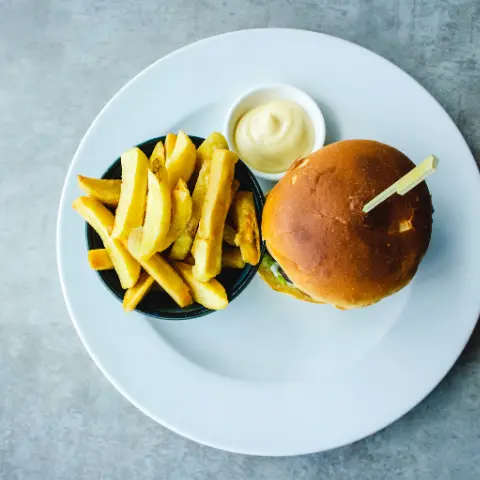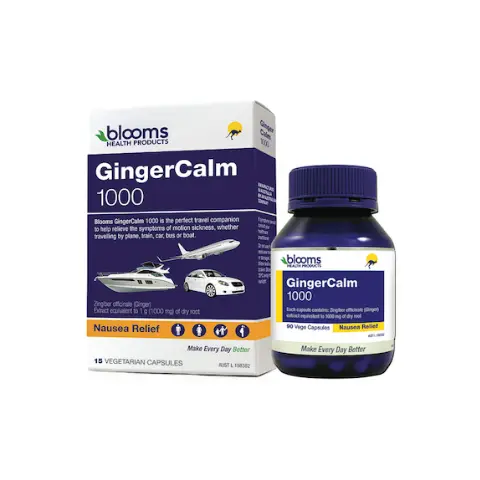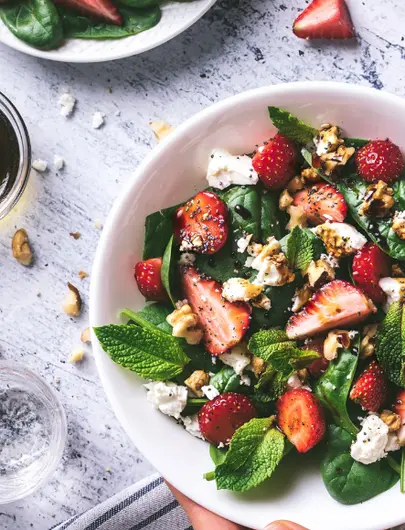Back
According to Mayo Clinic, indigestion (also called dyspepsia and often used interchangeably with acid reflux or heartburn) is a general term which describes discomfort in the upper abdomen.
Symptoms associated with indigestion can include bloating, burping, nausea, gas, pain or burning sensation in the upper abdomen and feeling overly full after eating.
For the most part, symptoms of indigestion can result from:
- Eating too much
- Eating too fast (and thus, swallowing air along the way)
- Eating foods that irritate the stomach
- High-fat foods (rich and greasy)
- Acidic or spicy foods
- Feeling stressed
- IBS
The good news? If you are someone that’s prone to indigestion, there are a few things you can do to both ease and avoid it altogether!
1. Chew slowly (and with your mouth closed)
Did you know that the process of digestion actually begins in the mouth? Our saliva consists of clever little enzymes that start to break down the food we eat so that by the time it travels through the GI tract, it’s already had a head start.This is why it’s super important to chew your food slowly (and with your mouth closed) to avoid swallowing air which causes bloating and trapped gas. Also, try and eat until you're 80% full (your brain takes a while to catch up!).
Image: Unsplash

2. Drink beverages between meals, not during
Consuming liquid with food can cause bloating, indigestion and as some research suggests, nutrient malabsorption. It's a much-debated topic but some nutrition professionals believe that water can dilute digestive juices and thus, interfere with digestion, with some recommending drinking beverages in between, not during. This is also due to the fact that liquid adds volume to your stomach, which increases stomach pressure just as a large meal would. Our advice? Listen to your body!
3. Avoid late night snacking
Our GI tract is built and structured in a way that works for our body (ie. vertically) so when we lie down, this can really shake things up. Heartburn in particular can be triggered by eating and then lying down soon after. Your body needs time to digest before it turns all its attention to sleeping, so it’s a good idea not to eat too close to bedtime. Allow (at the very least) 2 hours after eating before going to bed.
Image: Unsplash

4. Watch out for spicy and acidic foods
Some people can be sensitive to spicy and acidic foods which can result in reflux (a burning sensation in the upper abdomen and chest). Acidic foods include citrus fruits, tomatoes, capscium and coffee (sorry!). Some spices such as chilli (as well as spicy foods) can also affect some people.
5. Limit your alcohol intake
When is this isn’t a GMB tip? Alcohol, in particular, wine, is a common cause of indigestion and acid reflux as it increase the amount of acid produced in the stomach and also relax the muscles surrounding the stomach, interrupting its regular digestion process. If you do suffer from indigestion, your best bet is to enjoy alcohol-free swaps instead. Lucky for you, we have a whole list of recommendations here!
6. Swap out coffee
Ah, we know, we know. This is a hard one. But coffee is one of the most common culprits when it comes to triggering symptoms of indigestion such as heart burn. Acidic in nature, coffee is just another one of those drinks that relaxes the lower esophageal sphincter (LES), causing a disruption to regular digestive mechanisms. Try and lower your intake or enjoy a herbal tea such as ginger, mint or licorice instead.
Image: Blooms

7. Go for ginger
Ginger is one food that's renowned for soothing an upset stomach. Sip it as a herbal tea, add it to your cooking where possible and in your fresh juices to really reap the benefits. Ginger is also great for easing symptoms of nausea! For when you're on the go or travelling, Bloom's has an easy travel pack consisting of ginger capsules that work much the same way as fresh ginger for those times of need. You'll find them in the May GoodnessMe Box!
8. Avoid high fat, fried and greasy foods
Heavy foods that are high in fat are also known to cause indigestion. The reason for this is that they are usually harder to digest which means they stay in your stomach longer and the entire process is slower than normal. This then leads to your stomach creating more acid which irritates your digestive system. It also has the same affect as other culprits by affecting your lower esophageal sphincter (LES).
Foods that cause indigestion:
- Alcohol
- Onion/garlic
- Spices such as chilli
- Citrus fruits
- Coffee
- Soft drink
- Tomatoes
- Capsicum
- Sugary drinks
- Caffeinated drinks
Foods that can help with indigestion:
- Ginger
- Mint
- Lemon
- Cinnamon
- Aloe vera juice
- Parsley
- Basil
- Licorice
- Fennel
- Water
If you do have recurring or prolonged digestive symptoms, our advice is always to speak to your health care professional.

